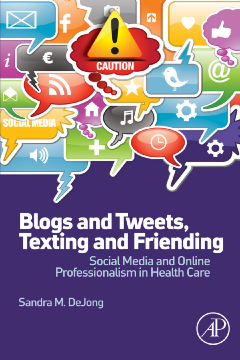
Additional Information
Book Details
Abstract
Blogs and Tweets, Texting and Friending: Social Media and Online Professionalism in Health Care summarizes the most common mistakes — and their legal and ethical ramifications —made in social media by busy health care professionals. It gives best practices for using social media while maintaining online professionalism. The book goes on to identify categories of caution, from confidentiality of patient information and maintaining the professional's privacy to general netiquette in tweeting, texting, blogging, and friending. And it guides you in setting up a faculty page (or choosing not to) and managing your online footprint.
The connected generation regularly uses social media, including health care professionals, but what happens when a patient wants to friend you? Or when you've already posted a rant on a patient that gets viewed by others? What information may already be floating on the Internet that a patient may find about you in a Google search and that might impact your therapeutic relationship?
Whether you are new to social media or an expert user in your private life (but haven't thought about what this means for you professionally), this book is for you. It’s the "when" and "how" to use social media effectively while maintaining online professionalism.
- Identifies social media best practices for maintaining online professionalism
- Covers multiple forms of social media, from blogs and tweets to texting and friending
- Includes case vignettes of real-life actions and their repercussions
- Intended for the protection of both the professional and the client or patient
"The issues discussed apply to anyone providing treatment. In addition, there are chapters that pertain to all health providers regardless of specialization...I found DeJong’s book to be highly informative and necessary reading."--PsycCRITIQUES, July 21 2014
"DeJong offers this reflection and recommendations guide on the intersection between professionalism and digital technologies in health care…The primary chapters…explore how online communication interacts with liability and malpractice, confidentiality, privacy, libel, conflict of interest, academic honesty, and safety and reporting to present unique challenges and potentially dangerous situations to beware."--ProtoView.com, February 2014
